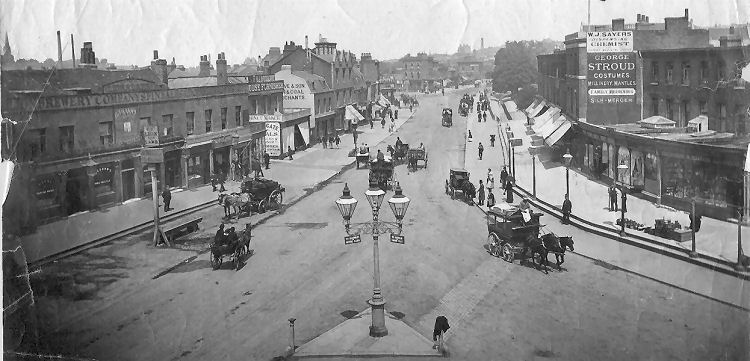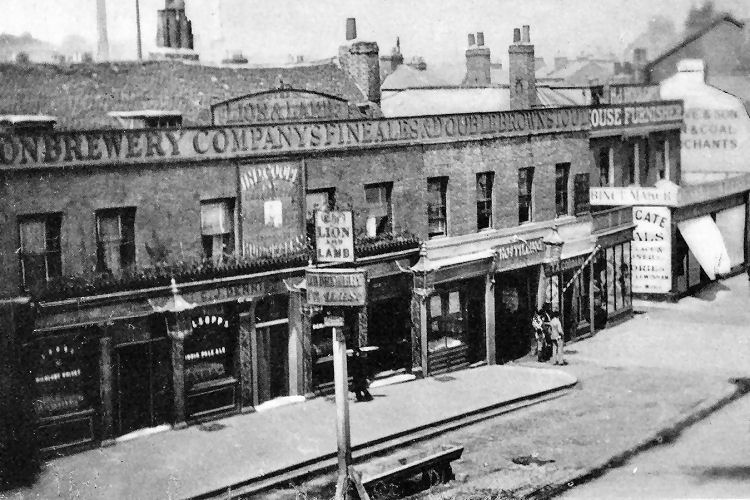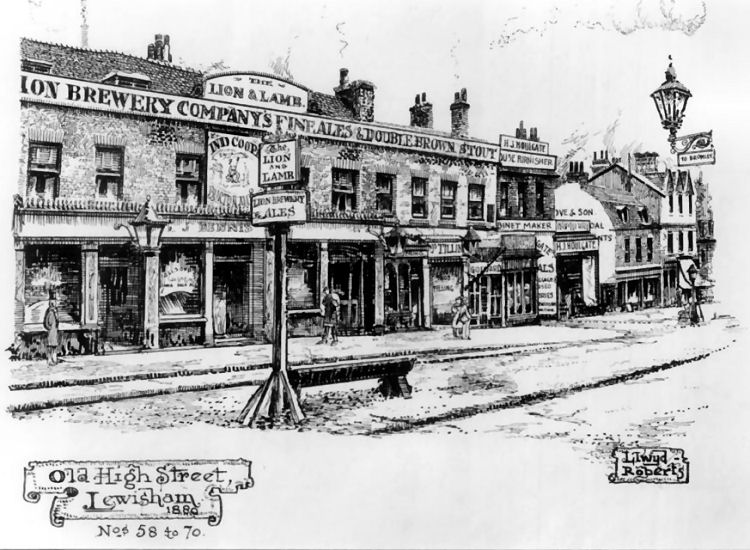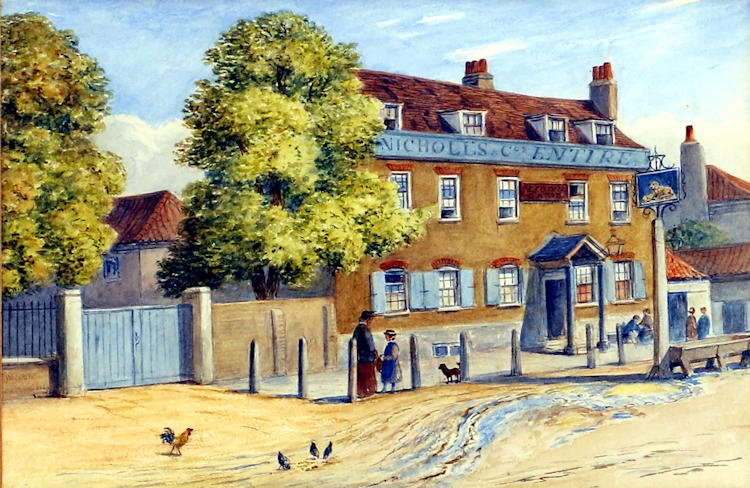|
From the Maidstone Gazette and West Kent Courier, 26 January 1830.
A short time ago, a rumour very generally prevailed throughout the
neighbourhood of Lewisham and Lee, in this County, that a young female,
named Francis Balcomb, servant to a Miss Gray, who died on the 5th of
the present month, had fallen victim to starvation, and the want of fire
to preserve her from the in inclement of the weather.
Application was, therefore, made to Mr. Carttar, the Coroner for the
County, who at once directed a Jury to be summoned, and and inquisition
accordingly sat at the "Lion and lamb Tavern," Lewisham, at 5 o'clock on
Saturday evening, for the purpose of ascertaining the real cause of the
deceased's death. The decision was not made, however, until 10 o'clock
on Monday night, the case having been adjourned for further enquiry.
Mr. Smith, solicitor, attended as the legal advisor of Miss. Gray, to
watch the proceedings. A great number of witnesses were examined, and
the medical gentlemen gave it as their decided opinion that the deceased
died from an inflammation of the stomach.
The Jury found a verdict "Died a natural death," to which they attached
some extra judicial observation, which we refrain from publishing.
|
|
Dublin Evening Packet and Correspondent, Saturday 27 June 1835.
Extra ordinary self-destruction.
On Tuesday an inquisition was taken before C. J. Carttar, Esq., the
coroner for Kent, and respectable Jury, at the "Lion and Lamb Tavern"
Lewisham, on the body of George Douglas, formerly and extensive
shipowner and man of property, who was found dead in Forest Wood, near
Brockley, on Friday.
A number of medical gentlemen were in attendance throughout the enquiry,
the deceased having of late years held a situation in St. Thomas's
Hospital, to which he was recommended by the Princess Sophia.
William Belcher, shopman to the apothecary of St. Thomas's Hospital,
stated that he had known the deceased between four and five years, at
which period he was admitted a patient in St. Thomas's. Witness saw him
last alive about a quarter before eight on Friday morning, when he came
to the apothecary's shop, and asked for a little prussic acid to kill
two dogs with. He has been on several former occasions for the same
thing, as he was connected with the dissecting-room, where dogs are
killed for the purpose of experiments. Witness gave him about two
drachms, and the deceased held up the phial, and looking sternly at it,
remarked that he thought it was scarcely enough; but witness assured him
to the contrary. He appeared rather grave at the time, but there was
nothing particularly unusual in his manner.
Charles Penfield, of Forest Hill, gardener, depose that he discovered
the body of the deceased on Friday in Forest Wood, near the footpath, on
his back, his arms close to his sides. There were several papers around
him. The witness first saw him he thought it was a drunken man, but
having called him thrice to get up, in vain, he procured assistance, and
he was removed on a shutter to a neighbouring public house, where it was
ascertained he was dead.
Mr. Samuel Hill, surgeon of St Thomas's, stated that he saw the deceased
about 9:30 on Thursday night. He told witnessed that Miss Fuller had
been to consult him about a pain in her head. Witnessed asked if he was
his old sweetheart and he replied in the affirmative. He appeared to be
rather downcast. Two drachms of prussic acid and more than sufficient to
produce death.
The Coroner handed Mr. Hill the following letter found by the deceased's
side in Forest wood, and which were proved to be in his handwriting.
They were all written in pencil.
"To all whom it may concern - I hereby certify with my own hand that I
am perfectly sane, and that I bequeath my body to the lecturers, &c, of
St. Thomas's Hospital, to be made use of for the benefits of society, as
they think fit. Written on Nunhead Hill by me."
Signed George Douglas.
2d. "Whoever may chance first to see me will pleased to forward these
notes as directed, and they have the well wishes of an unhappy man."
3d. Mr. M'Murdo:- Tomorrow you will owe me 35 s. pay it to my widow -
she is honest and virtuous, and desires your protection and assistance.
I die the victim of unmerited jealousy."
Directed, Mr. M'Mundo, surgeon
&c., Old Broad Street, City.
4th. Mr. Hill, I have done my duty towards you honestly and as
diligently, and would do so still, but, alas my doom is out, and I must
say farewell! Miss Fuller, by her wicked artifices, has destroyed all
that happiness existing between me and my wife, and I can't survive her
hatred; therefore end with prussic acid my misfortunes.
Signed G. G.
"To Mr. S. Hill. St. Thomas's Hospital, Borough
5th. My dearest wife - You have given me one awfully convincing proof
that you cannot love me more, and to prove to you I cannot live without
your love, I die; but before I close this life, I wish you to understand
that I was never for one moments false to you since we wedded, and that
I died a virtuous and honest man, as far as regards the cause of all our
distresses. Farewell, may you live long and be happy in the embrace of
some one as true as I have been to you, and more fortunate. You will now
believe me when I say that for you alone I lived, and through you die.
Before you get this letter I shall be no more.
Signed George Douglas.
Directed to Mrs. Ann Douglas, 8, New Way, St Thomas's, Southwark.
6th. "Eliza Fuller - Your revenge is now as complete as you could wish.
My wife is an unhappy widow, and I am a self damned wretch, be
satisfied, and I forgive you all you've cost me - that is, a loving
wife, and my own soul's salvation. Eliza, you are your own destroyer."
Signed G. D.
Address to "Elisa Fuller, 10, Union Court, Red Cross Street, Borough.
Mr. Hill explains that the 35s. alleged by the deceased to be due to
him, was for his last weeks wages. Mr. M'Murdo was lecturer of the
hospital. The deceased had not being married to his wife above five
weeks.
A Juror:- Has the deceased not undergone an operation?
Mr. Hill:- Yes, and a very painful one; he lost his nose, as he said,
from being frostbitten, and Mr. Green, of St. Thomas's, cutaway part of
his scalp and brought it down over his face, so as to form a nose. He
(deceased) also had a lip made out of a piece of his neck.
Juror:- Would not that operation disturb his mind?
Mr. Hill:- I should say not, for the operation of the nose was performed
above three years ago.
Coroner:- Was it done by his own consent?
Mr Hill:- Oh yes, perfectly; he wrote to Mr. Green requesting that
gentleman to perform the operation, and although it took above an hour
and a half he did not make one single murmur.
By the Coroner:- The deceased was a passionate man and easily excited;
he was of very fine and acute feelings.
Robert Fuller, of 10, Union Court, Borough, tailor, here stood forward,
and said he was the father of Eliza Fuller, to whom the deceased had
addressed a note. The deceased had paid his addresses to his daughter
for about two years and had frequently requested his consent to marry
her; but he declined it until January, considering up to that period
that the deceased was insane from the strange boasts he would make of
General Hay and others being indebted to him in large sums of money,
which was not the case. In January he consented to the union, and the
deceased fixed some day in May for the celebration of their marriage;
but in the beginning of April he suddenly, and without any explanation,
discontinued his visits. At the latter end of the same month he was
married to another woman. The following extraordinary letter he wrote to
his daughter just before his marriage.
"Dear Eliza - Pardon me for not having performed by promise, for truly I
cannot. I have made several attempts to come to you but my heart fails
me. Deem me not frozen-hearted. The time is not yet, but will come when
you shall see a wretch, and from his this here a dismal fate - dismal,
indeed, though yet to mortal ear has never been divulged - then you will
know it is not for nothing I am thus sunk low in sorrows hateful gulph.
Yes, you behold a wretch despaired, feared, yea, even damned, a monster,
buy those whom I by word or action ne'er did injury to, but who's
calumnious tongues would make me seem all that man should depreciate and
scorn. Then you will be convinced that you have been dealt mercifully to
by your real well wisher. Till then, farewell.
I am, with unfeigned respect.
Signed George Douglas.
"If you will look out what books, &c., of mine that are of my use to
you, and let Thomas know when to call for them, you will much obliged
me. Recollect I want no earthly things from you that can be of service
to you in any shape at all, and if you wish me well, as I believe you
do, you will keep all within your own breast that you know of a most
unhappy being who is not what he seems to be. Wednesday morning, 1
o'clock.
The inquest room was cleared of strangers, and after a short
deliberation, 13 out of 15 of the Jury returned a verdict. "That the
deceased destroyed himself, being at the time in a fit of temporary
mental derangement;" the other two Jurymen were of opinion that the
deceased was sane at the time.
|



